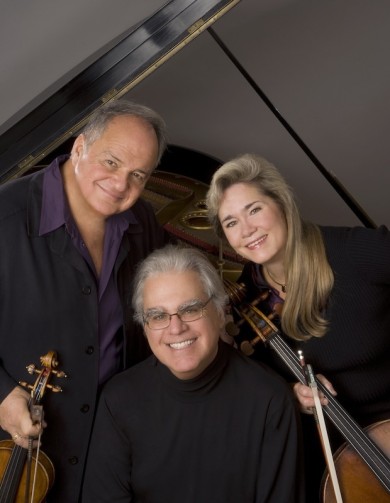KLR Trio launches Beethoven cycle with strong start

The Kalichstein Laredo Robinson Trio performed the first concert of their Beethoven series Thursday night at Gusman Concert Hall. Photo: Christian Steiner
The Kalichstein Laredo Robinson Trio’s complete traversal of Beethoven’s piano trios for the Friends of Chamber Music got off to a strong start on Thursday night. A sizable audience filled UM’s Gusman Concert Hall for a program that mixed early Beethoven with a rarely played mature work and a charming appetizer.
The musical hor d’oeuvre was the “Kakadu” Variations. Beethoven ingeniously created a grave introduction to a theme by Austrian composer Wenzel Müller, almost a country dance tune, followed by 20 variations. Even in this brief work, Beethoven’s mastery is preeminent as he turns the slightest of material into striking musical vignettes.
Before he was felled by tragic deafness, Beethoven was a formidable pianist and the keyboard writing in the trios is complex and consistently inventive. Joseph Kalichstein was equal to the task. The Kakadu theme was given courtly elegance, with Kalichstein’s tonal shadings widely varied. Although his violin tone is slightly harder at times than in the past, Jamie Laredo’s musicianship and ensemble skills remain strong, especially in duo with the burnished cello sonority of Sharon Robinson. The entire performance was stylish and expressive.
The Trio in E-flat Major, Op. 1, No. 1 comes from the musical realm of Haydn and Mozart, the young Beethoven conveying high spirits while paying homage to classical tradition.
Kalichstein launched the initial Allegro in nimble, brisk fashion. The second subject emerged finely pointed, with the string sonority large and vibrant and musical conversations subtly conveyed. For an early Beethoven work, the Adagio cantabile is surprisingly deep and profound, and here Laredo and Robinson brought out details that are often obscured. The Scherzo was appropriately playful with the players adding a dash of brusque impetuosity. With Kalichstein setting a highly energetic pace, there was plenty of brio in the Presto finale, the playing both delicate and forceful.
The Piano Trio in E-flat Major, Op. 70, No. 2 finds Beethoven at the height of his creative powers. In introductory remarks, Kalichstein compared the score to the works of Schubert and there is definitely a Viennese aura to this vigorous and lyrical piece.
There were some rough moments from the strings in the first movement but the performance soon settled in. The second movement Allegretto is unusually serene with a remarkable wellspring of melodic writing. From stormy displays of power to the most soft and bright strokes, Kalichstein’s dynamic range was impressive. The intimate dialogues seemed almost improvised, the trio’s teamwork and interpretive depth in prime form.
Laredo brought tonal sweetness and supple phrasing to the graceful theme of the third movement. Some of the mystery of Beethoven’s late string quartets makes an appearance and the players vividly switched gears at these sudden eruptions.
After a rousing pianistic opening, there was an abundance of dancelike vigor in the concluding Allegro, the ensemble articulation strong and incisive. The first installment of this Beethoven cycle proved more than promising. Kalichstein also contributed an outstanding essay on Beethoven’s trios in the program book.
The Beethoven cycle continues 8 p.m. Saturday and Sunday at UM Gusman Concert Hall in Coral Gables. Saturday’s program features the Trio in B-flat Major, Op. 11, Trio in C minor, Op. 1, No. 3, Variations in E-flat Major and Trio in D Major, Op. 70, No. 1 (“Ghost”).
Sunday’s program includes the Trio in G Major, Op. 1, No. 2 and Trio in B-flat Major, Op. 97 (“Archduke”). miamichambermusic.org 305-372-2975
Posted in Performances
Leave a Comment
Fri Feb 12, 2016
at 2:04 pm
No Comments





